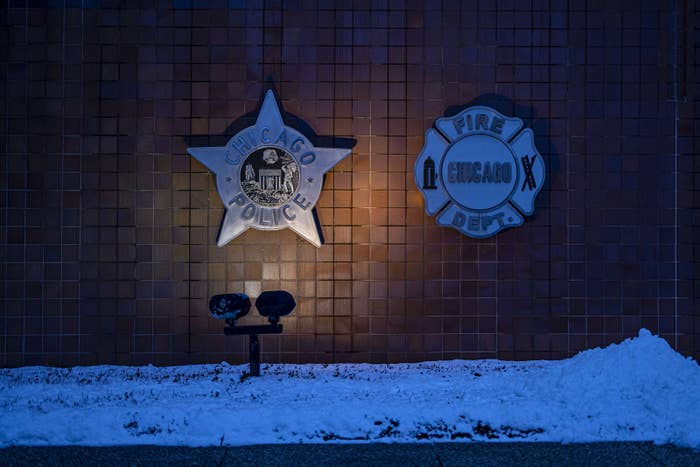
Two Chicago men who have each spent 23 years in prison had their murder convictions tossed out based on the police work of a detective accused of framing more than 70 people for homicides they did not commit.
Eruby Abrego, 43, and codefendant Jeremiah Cain, 47, became the 27th and 28th people exonerated — and the seventh and eighth cleared within the last 12 days — based on allegations that retired detective Reynaldo Guevara routinely beat suspects and witnesses, coerced confessions, and used threats in order to close murder investigations.
“I want to scream to the world,” Abrego’s sister, Debbie Daniels, told BuzzFeed News about her brother’s release. “They slandered our family name.”
A 2017 BuzzFeed News investigation documented widespread reports of corruption by Guevara.
Abrego and Cain were convicted of the 1999 murder of 46-year-old Jose Garcia and wounding 20-year-old Julio Lugo. Garcia had been sitting in the passenger seat of a parked car with his nephew, Ramon Torres, in the driver’s seat. Lugo, along with his 10-year-old cousin, was chatting with Garcia and Torres when a young Latino with a hood pulled low over his face called out a rival gang taunt, then opened fire from across the street. Lugo had bullet wounds in his shoulder and buttocks but survived. Garcia suffered a shot to his head.
Witnesses at the scene described the shooter as 5’7” with dark skin. Abrego measured 5’4” with light skin.
One man, who had already been acquitted of Garcia’s murder, testified at a recent hearing that he had been the one to fire the gun. Torres, the witness in the driver’s seat, cried inconsolably during a hearing earlier this year, testifying that Guevara told him whom to select out of a lineup.
Guevara has invoked his Fifth Amendment right to remain silent when asked about allegations of misconduct.
Yet Guevara isn’t the only police officer accused of misconduct in this case.
Abrego said that one of Guevara’s colleagues, Detective Anthony Wojcik, punched Abrego 20 to 25 times, “like I was a punching bag,” while he was chained to the wall. Abrego said detectives denied him food for more than 24 hours. When Wojcik later appeared in the interrogation room, Abrego complained of feeling queasy and needing to vomit. According to court documents, Abrego vomited blood, and when he asked Wojcik to take him to the hospital, the detective said, “Just tell me what I want to hear and I’ll take you wherever you want to go.”
A “scared, hungry” Abrego then falsely confessed to killing Garcia.
Cain’s statements to Wojcik change over the course of his interviews. He alleged Wojcik beat him into making false statements until they fit the police’s narrative of the crime: That Abrego was the shooter. Police claimed they found a handgun linked to the Garcia murder, but Cain said he had no knowledge it had been used in a crime.
Lawyers for Abrego and Cain called witnesses to testify that Wojcik, like Guevara, has a pattern of brutalizing suspects. In 2014, when Chicago police fired 16 bullets into the body of a 17-year-old Black boy named Laquan McDonald, Wojcik approved police reports that contained lies in an attempt to cover up McDonald’s murder. A Department of Justice investigation into the Chicago police cited the reports Wojcik approved in the McDonald case as evidence of highly troubling procedures within the department.
Wojcik denied wrongdoing in the case. BuzzFeed News left messages with his attorney but did not receive an immediate response.
Wojcik’s name “is not a name that a lot of people have heard yet but it’s a name that people will hear because he has done systematic efforts to coerce and torture people into confessing to crimes against their constitutional rights,” said David B. Owens, one of Abrego’s attorneys.
“This is an all-star cast of detectives with troubled backgrounds.”
The state’s attorney’s office dropped charges months into hearings in which a parade of witnesses testified to being abused by Wojcik and Guevara. Tossing the convictions rather than allowing a judge to issue a decision in the case eliminates the possibility that the court would issue an unfavorable ruling involving Wojcik. That unfavorable ruling could then open legal pathways and buttress claims of more than a dozen men who have already filed in court claiming they were beaten into false confessions.
Karl Leonard, another Abrego attorney, doesn't buy that hypothesis.
"If the state wanted to avoid making a record made in this case in other Wojcik cases they could have made this decision years ago before the other victims took the stand," he said. "I don’t think it’s convenient timing."
In a statement, the state’s attorney’s office said that in the matters of Abrego and Cain, "our review concluded that these convictions were not in the interest of justice, and today we withdrew our opposition to the post-conviction petition and dismissed the case."
Cain’s brother, Alexander, who has only been able to give his brother a thumbs up from across the courtroom for the last few decades, said, “I want to give the guy a hug.”
Abrego returns home to his mother, Oralia Cerna, 78, whom doctors last month declared free of breast cancer. He will also be greeted by Juan and Rosendo Hernandez, two brothers exonerated last week, who went shopping to buy Abrego clothes for his release.
But Abrego’s sister said her work isn’t over with her brother’s release.
“Wojcik,” she said, “I’m coming for you.”
